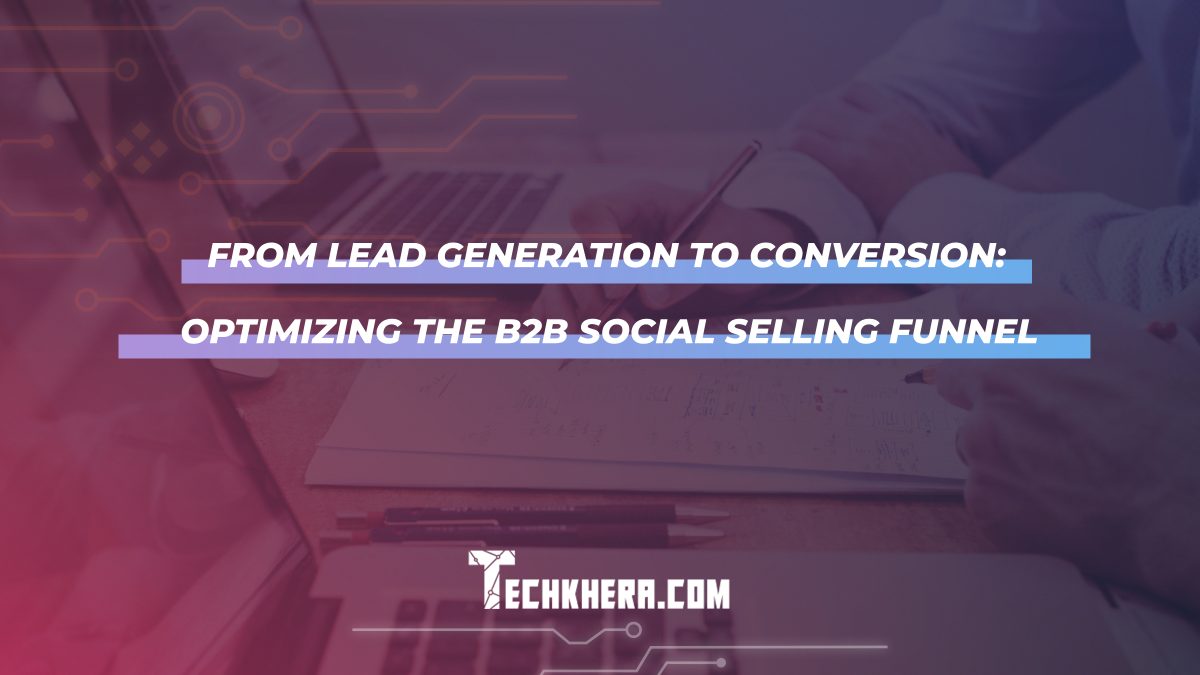
From Lead Generation to Conversion: Optimizing the B2B Social Selling Funnel
In the B2B arena, the practice of social media engagement has emerged as a pivotal strategy for businesses aiming to forge connections with prospective clients. This approach extends well beyond the traditional scope of advertising, focusing instead on cultivating relationships, comprehending the requirements of customers, and presenting solutions that directly address these needs within the digital spaces where these dialogues naturally occur.
Given the typically extended sales cycles and deliberative decision-making processes characteristic of the B2B domain, social media engagement offers a distinctive avenue for meaningful interactions with potential clients. The journey from initial contact to securing a deal is intricate, demanding a thoughtfully crafted strategy to achieve success.
By implementing the appropriate techniques, companies can refine their engagement process, transforming prospects into dedicated clients. Data reveals the effectiveness of social media engagement, noting that 78% of companies employing this strategy outperform their peers who do not. This statistic highlights the significant role social media engagement can play in bolstering B2B sales outcomes. Let’s explore strategies for optimizing each phase of the engagement process, from initial contact through to the successful conclusion of deals.

Contents
Effective Techniques for Initial Contact
Achieving success in initial contact on social platforms necessitates employing a combination of widespread and focused techniques. This begins with the creation of content that resonates on diverse social media channels, tailored to the challenges and interests of the intended audience.
As companies deepen their engagement efforts, prioritizing platforms known for robust user interaction is key. Instagram, for example, with its visually engaging content and high levels of user activity, stands out as a crucial platform for reaching B2B audiences. At this stage, companies should look for IG services and tools designed to foster growth and provide functionalities such as detailed analytics, automated interactions, and sophisticated advertising capabilities. Utilizing these resources, businesses can fine-tune their Instagram strategies to draw in more qualified leads, thereby enhancing their overall initial contact efforts on social media.
Cultivating Relationships Through Tailored Engagement
Following the generation of leads, the subsequent phase involves cultivating these nascent relationships through tailored engagement. This requires a deep understanding of each prospect’s unique needs and challenges, and offering pertinent information and solutions in response.
Tailored engagement is not confined to digital interactions; it also encompasses traditional techniques like cold calls and email outreach. When these strategies are thoughtfully customized and aligned with the recipient’s interests, they can effectively complement social media engagement efforts by establishing a direct communication channel with potential clients.
Cold calls, characterized by a personalized touch, can penetrate the barrage of digital communications, fostering a sense of trust. Similarly, well-composed, individualized emails that deliver value can pave the way for more in-depth discussions and engagement opportunities. Integrating these traditional outreach methods with social media engagement offers a comprehensive approach to relationship cultivation, enhancing the likelihood of converting prospects into committed clients.
Securing Deals: Strategies for Closing
The process of closing deals within the framework of social media engagement involves a judicious mix of persuasion and facilitation. This entails clearly articulating the advantages of your product or service, addressing any lingering doubts or objections, and easing the decision-making process with offers such as trials, demos, or consultations.
The aim is to streamline the transition from prospect to client, making it as persuasive and frictionless as possible. Effective follow-up measures are vital at this juncture, ensuring that leads stay informed and engaged throughout the decision-making journey. Customizing follow-up communications based on past interactions can markedly enhance the likelihood of securing a deal.
Evaluating Success and Refining the Process
Assessing the effectiveness of your social media engagement strategy and making necessary adjustments is imperative for sustained success. This requires a methodical analysis of metrics such as user interaction rates, the rate at which leads become clients, and the return on investment of social media engagement activities.
Analyzing this data helps identify successful strategies and areas needing improvement. Continually revising your approach based on these insights ensures that your engagement efforts remain relevant and impactful. Conducting tests on various aspects of your strategy can identify the most effective practices and messages.
Moreover, soliciting feedback directly from your audience through surveys or feedback mechanisms offers invaluable insights, further refining and enhancing your social media engagement strategy.

Conclusion
Refining the process of transforming prospects into clients within the B2B social selling landscape necessitates a tactical plan that resonates with the stages a buyer traverses. Grasping the essence of this conversion pathway, adopting potent methods for attracting and cultivating potential clients, capitalizing on the credibility that social endorsement brings, and deploying impactful tactics to finalize deals are pivotal for elevating social selling endeavors.
The importance of gauging accomplishments and iteratively refining this process through insights gleaned from outcomes cannot be overstated for sustaining progress. The execution of these methodologies promises a notable enhancement in the efficiency of turning leads into customers, thereby propelling the advancement of the business.
